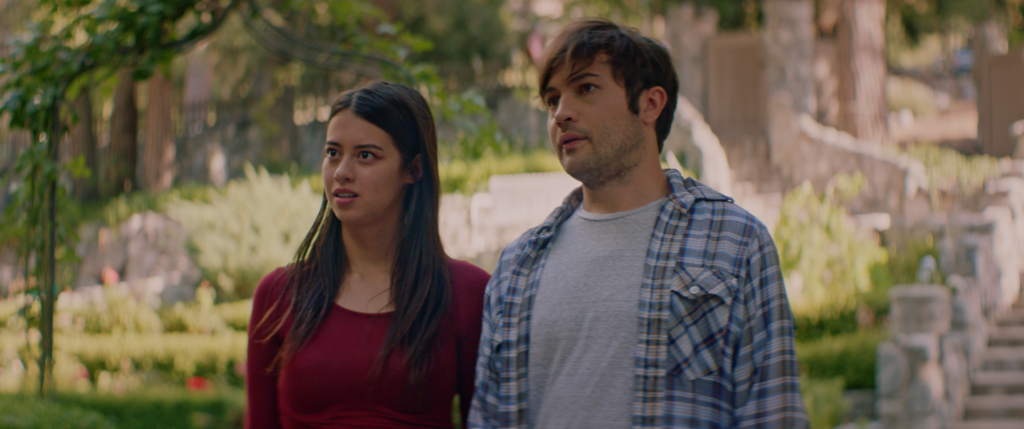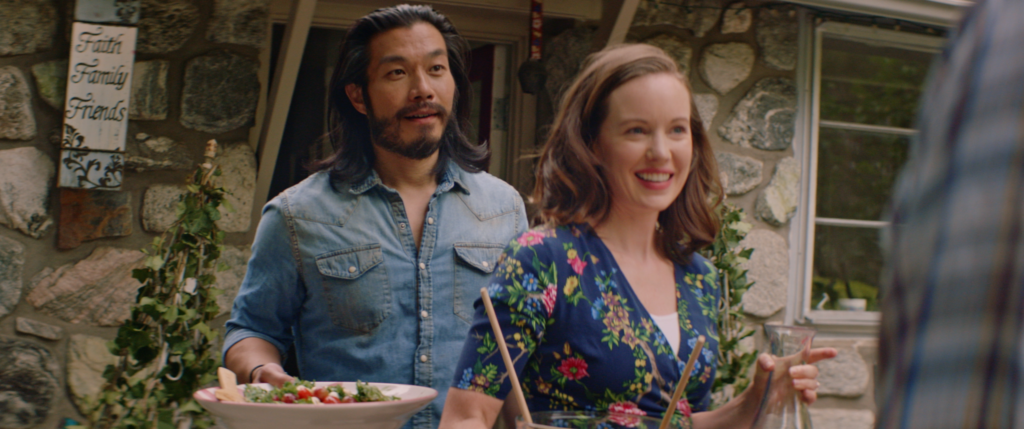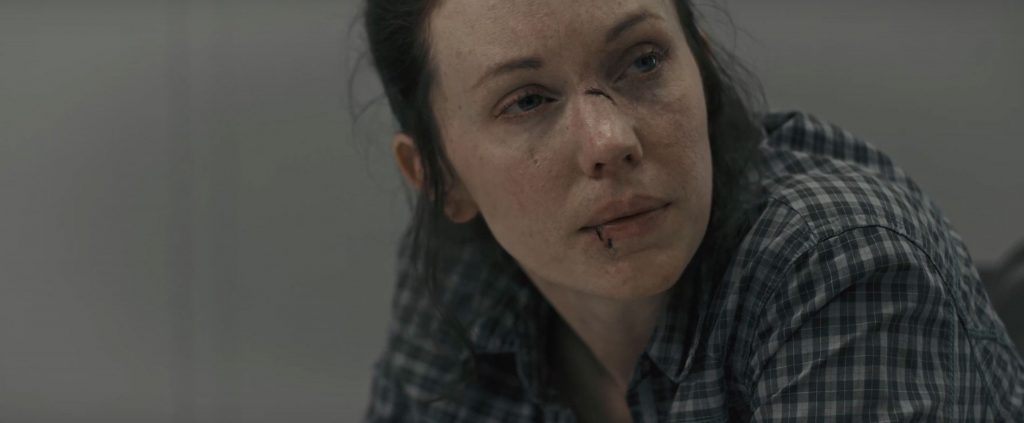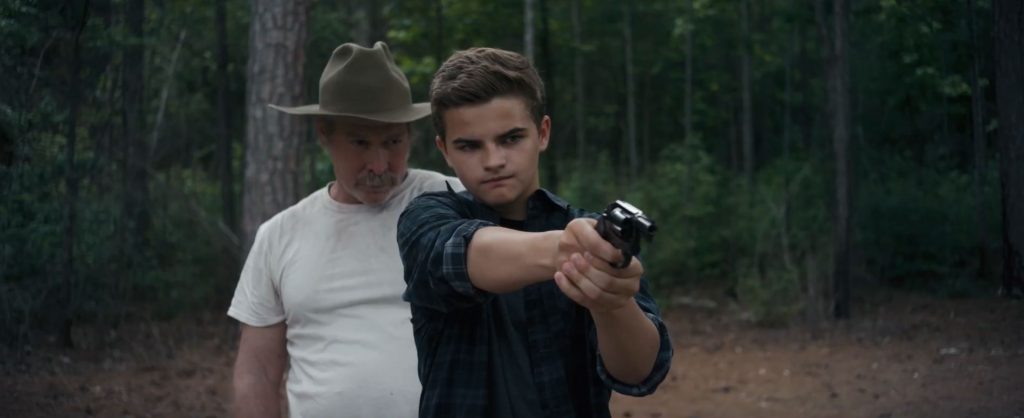August 22, 2022
by Carla Hay

Directed by Steve Pink
Culture Representation: Taking place in California, the dramatic film “The Wheel” has a racially diverse cast of characters (Native American, white, Asian and multiracial) representing the working-class and middle-class.
Culture Clash: A married couple, contemplating divorce after eight years of marriage, will decide if they will split up or stay together during a getaway retreat.
Culture Audience: “The Wheel” will appeal primarily to people who are interested in authentic-looking relationship dramas with characters who are neurotic.

“The Wheel” thinly stretches the “will they or won’t they break up” dilemma for the movie’s central married couple, until the movie’s very last scene, which is the best part of the film. This relationship drama is mostly well-acted but very repetitive. Despite its shortcomings, “The Wheel” at least realistically depicts people and relationships as sometimes messy and flawed.
Directed by Steve Pink and written by Trent Atkinson, “The Wheel” had its world premiere at the 2021 Toronto International Film Festival. The movie’s title could be inspired by the pivotal last scene, which takes place when the two spouses have an emotionally charged conversation on a Ferris wheel. However, the title of “The Wheel” could also refer to the seemingly endless cycle of dysfunction and anguish that can happen if people fail to communicate properly in relationships.
That’s why this question is presented throughout the film: “Will anyone in this couple want to stay in this marriage, which keeps going around in circles of arguments and misunderstandings?” The movie’s opening scene shows married couple Albee (played by Amber Midthunder) and Walker (played by Taylor Gray) having just such an argument.
Albee and Walker, who are both about 24 years old, live in California, where the movie was filmed on location in Angelus Oaks and Malibu. Albee is an aspiring actress, while Walker’s job is not stated in the movie. Walker and Albee later tell someone that they got married at age 16, and have been married for eight years.
Why did they get married so young? Walker and Albee, who are both originally from Texas, both grew up fast in the foster-care system. They no doubt married each other to feel like they could have some kind of stable family life that they didn’t have as foster kids.
And now, the marriage of Albee and Walker has reached a critical point. The movie’s opening scene shows Albee telling Walker that she’s irritated by him when they are somewhere outdoors. Walker says he doesn’t know why she’s angry with him, but that he’s sorry for whatever he did.
This apology just makes Albee even more upset, because she thinks Walker should know what made her angry in the first place. Albee doesn’t want to explain it all to Walker. She thinks part of the problem is that he’s completely unaware of what he did to offend her. The argument continues when Albee and Walker are seated at a table in a diner.
Eventually, Albee and Walker call a tentative truce in this argument. However, this argument is an indication of how Albee and Walker interact with each other for most of the movie. Albee expects Walker to read her mind and know instinctively how to make her happy. Walker wants to make Albee happy, but she doesn’t express to him that she loves him as much as he loves her.
Walker is an optimist about love and wants to save the marriage. Albee is a pessimist and is more reluctant to stay married to Walker, but she’s also afraid of being alone and getting hurt by divorce. Albee gives Walker the impression that she’s possibly fallen out of love with him, while he’s still in love with Albee and wants to bring back the romantic passion in their marriage.
Eventually, Albee and Walker decide to go to a getaway retreat, by renting a cabin in the woods. Before taking this trip, Walker and Albee agree that they will decide the fate of their marriage during this retreat. They also vow to be completely honest with each other, regardless if what they have to say is good or bad. Walker has recently bought a relationship self-help book, and he wants to use the book’s advice with Albee during this trip.
Albee and Walker have rented the cabin through Airbnb. The cabin’s Airbnb hosts are an engaged couple in their 30s named Carly (played by Bethany Anne Lind) and Ben (played by Nelson Lee), who are staying at a nearby cabin and at first seem to have an idyllic relationship. Soon after Walker and Albee arrive at the cabin, they both meet Carly, who welcomes Albee and Walker in a friendly manner. However, Carly can’t help but notice the tension between Walker (who is polite to Carly) and Albee (who is standoffish to Carly) as soon as Carly meets them.
Carly mentions that she hopes that Albee and Carly will find the cabin ambience to be romantic during the couple’s stay, but Albee comes right out and tells Carly that Albee and Walker have taken this getaway trip to decide if their marriage is worth saving. It’s an awkward moment, but it sparks curiosity in Carly to try to help Albee and Walker. Carly takes it upon herself throughout most of the story to be an unofficial relationship counselor to these two strangers.
Albee is immediately annoyed when she finds out that the cabin has no WiFi service, and she can’t get a signal on her cell phone. She goes outside and is elated when she’s able to get a phone signal. Walker can’t help but notice that Albee has been excitedly communicating with someone by text when she begins using her phone. It’s eventually revealed who this mystery person is.
On the first night that Albee and Walker stay at the cabin, she smokes a marijuana joint in a sauna and seems skeptical when Walker says, “If we can get through these last few months, we can get through anything.” Albee asks, “We’ll be okay though, right?” Walker senses Albee’s lack of interest in talking about their relationship in a meaningful way, so Walker leaves the room without answering the question.
Later, Albee rebuffs Walker’s advances to be sexually intimate. She tells a dejected Walker, “I’m not there. Sorry.” Walker says, “That’s okay. Sleep tight.” The movie keeps showing over and over that Walker wants to offer love, respect and passion to Albee, but she keeps rejecting him at every turn.
Carly has noticed this imbalance in the relationship too. On the first night that Albee and Walker are in the cabin, Carly tells Ben what was her first impression of Albee and Walker. Carly says that Walker seems nice, but Carly thinks that Albee is the kind of woman who thinks she’s too good for her partner. And so, when Ben meets Albee and Walker later, Ben already has a negative impression of Albee.
Albee (who is often rude and sarcastic to people) and Ben (who is laid-back and equally sarcastic) end up clashing with each other and insulting each other. Carly tries to be a peacemaker in arguments between Albee and Walker. And there are several arguments and sullen silences between Albee and Walker in this movie. After a while, these marital spats and refusals to talk to each other get a little tiresome. About halfway through this 83-minute movie, you’ll probably wish that Albee and Walker would just make up their minds already if they’re going to stay together or go their separate ways.
And why is Carly so personally invested in these two strangers and so ready to meddle in their marriage? It turns out that Carly and Ben are having some relationship issues too. Carly is excited to make wedding plans. As for Ben? Not so much. Carly thinks it has to do with men typically not being as heavily involved in wedding planning as women are.
After a while, it becomes obvious that Carly wants to be like an unofficial relationship counselor to Albee and Walker because Carly feels that she’s losing control of her own relationship. Carly is a die-hard romantic who thinks she can “fix” things in relationships if she just shows enough compassion. She even goes as far as asking Ben to surprise Albee and Walker by offering them a portable table of breakfast food so that Albee and Walker can eat breakfast in bed. He reluctantly goes along with the idea.
Ben feels almost the exact opposite way as Carly does in dealing with Albee and Walker. Ben thinks that he and Carly should mind their own business when it comes to Albee and Walker’s marriage, and Albee and Walker are better off figuring things out on their own. Ben also believes some relationships are doomed, no matter how much counseling is done. And he thinks Albee is very annoying, because Ben says that Albee reminds him of the women he used to date for the past 20 years in previous bad relationships.
As the couple struggling with the decision to break up or stay together, Midthunder and Gray give riveting performances, although at times there’s a little bit of overacting between the two of them. Lind and Lee, as the less-volatile couple Carly and Ben, are adequate in their roles, with Lee’s acting skills being a little stitled and wooden in a few scenes. Pink’s direction of “The Wheel” builds up enough tension for viewers to be curious about what will happen to these couples, but the movie tends to drag in some areas. Expect to see multiple scenes of pouting Albee and melancholy Walker staring off into space during the moments when they’ve decided to stop talking to each other.
Carly and Ben serve as a counterpoint to Albee and Walker, because both couples are unraveling in their own ways. Carly and Ben are lot quieter about their problems than Albee and Walker are, because Albee and Walker put their marital discord on public display. Albee (who is fickle, abrasive and often very selfish) will undoubtedly be considered the character in the movie who’s the most difficult to like, but “The Wheel” isn’t about making all of the characters “likable.”
People who are like Albee are usually very emotionally damaged for any number of reasons. The movie skillfully shows that people who are like Albee have such low self-esteem, they don’t think they deserve love. And when someone offers true love to these deeply insecure people, they often want to push that person away, or hurt that person first, in order to avoid getting hurt. In many respects, “The Wheel” is a fascinating portrait of love, patience and forgiveness. It’s also about having the courage to navigate relationship minefields, as well as having the courage to walk away when a relationship isn’t worth saving.
Quiver Distribution released “The Wheel” on digital and VOD on July 22, 2022.


